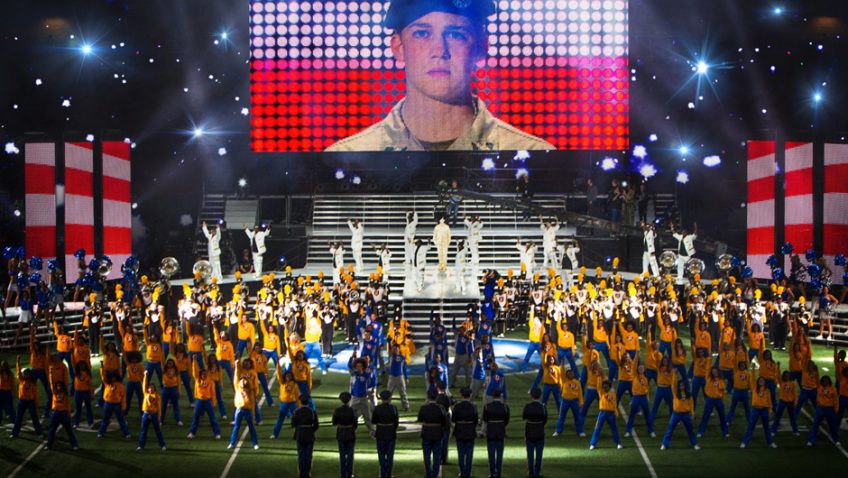Joyce Glasser reviews Billy Lynn’s Long Halftime Walk (February 10, 2017) Cert 15, 113 min.
The end of WWII marked the beginning of a flow of movies about soldiers who survived the war, but struggled to return to peace. From The Best Years of Our Lives (1946), to Born on the Fourth of July (1989); In the Valley of Elah (2007) to Stop-Loss in (2008) the maladjusted veteran with PTSD was reduced to a cliché.
Ang Lee’s new film is about such a soldier, but Lee, one of the great innovators of 21st century cinema (Crouching Tiger, Hidden Dragon, Brokeback Mountain, The Life of Pi), doesn’t do clichés. Billy Lynn’s Long Halftime Walk was conceived as a technically revolutionary film, the first feature to be shot at 120 frames per second (fps) as opposed to the customary 24fps. It was also shot in 3D and at very high (4K) resolution. That very few cinemas are equipped to show 120fps is another matter, and the film will be shown in cinemas at a normal frame speed.
Because Lee is also a great story teller, this technical virtuosity is much more than a 62-year-old reaffirming his place at the forefront of creative technology. The story (the script is written by Jean-Christophe Castelli, based on Ben Fountain’s novel) takes place in an intense 8-hour period, but one that includes many seamless transitions from a neon-lit stadium to Billy Lynn’s lamp- and moonlit family home in Texas and to the sun-bleached arid scrubland in Iraq.
Army specialist Billy Lynn (British drama student Joe Alwyn – sensational in his feature debut) is a 19-year-old Texan who happened to be videotaped in a daring attempt to save his wounded supervisor, Sergeant Virgil ‘Shroom’ Breem (Vin Diesel) during a gunfight in Iraq. In the process, Billy killed an Arab enemy in hand-to-hand combat. He became an overnight celebrity, and the military, thirsting for positive PR, was quick to exploit the media’s love affair with so-called ‘The Bravo Squad’ by allowing the squad to go on a victory tour.
Where we come in is when the squad are invited to appear on the pitch at halftime in a Dallas Cowboys Thanksgiving home game. Nothing but the media-hype is known about what transpired in Iraq. We are given glimpses of the truth when Billy’s mind wanders – triggered by a scuffle with mechanics, words, emotions, or the halftime fireworks – to that fateful day when a routine patrol became a life sentence.
The narrative is entirely subjective and Lee needed a way to put us inside the head of a conflicted, traumatised young man in mourning being paraded as a hero. Lee felt that the immersive power of his technical plan would do just that. What remains on most screens is the unsubtle, unforgiving high resolution which tends to flatten out the image like a soap-opera, but also gives it an air of hyper-reality, as though we taking part in the surreal halftime spectacle and in the all-to-real Iraq war.
The soldiers are the guests of Cowboys’ owner Norm Oglesby (Steve Martin) a smooth-talking crafty, callous money man who under the guise of patriotism will try to exploit the boys with a derisory offer for the film rights to their story. A vulgar stretch limousine arrives to carry off the Bravo Squad to the Cowboys Stadium. Greeting them at the airport is Cowboys’ PR man, Josh (Ben Platt) and travelling with them is Albert Brown, a cagey, third-rate film producer (Chris Tucker). Brown, who is after Oglesby’s investment, has the soldiers dreaming about a fee of $100K each if, as Brown explains, ‘we get somebody like Hillary Swank’. In the early nougties, when the film is set, Swank was a hot property having won an Oscar for portraying a trans man who adopts a male identity in Boys Don’t Cry.
It is a testimony to Ang Lee’s genius that this remark, aimed in jest at a blushing Billy, carries much more weight than its casual delivery implies. For when Billy is saluting during a resounding rendition of the Star Spangled Banner, tears stream like banners from his eyes, as they do at other times when he is replaying the Iraq attack scene in his mind. Boys do cry and so do macho war heroes.
Swank won her second Oscar for playing a boxer in Clint Eastwood’s Million Dollar Baby with its own gender identity theme. The Swank/Eastwood connection is not a self-reverential reference to Lee’s magnificent gay cowboy movie, Brokeback Mountain, but a nod to Clint Eastwood’s 2006 Flags of Our Fathers. In that film, three servicemen are paraded as heroes in a war bond drive, and one, John “Doc” Bradley, is incorrectly identified as being the flag-raiser of an iconic photo. As in Billy Lynn’s Long Halftime Walk, the uncomfortable servicemen reflect on the brutal truth of their experiences in flashback.
This intermingling of cinema, celebrity and the crass entertainment of the halftime extravaganza featuring Destiny’s Child, with war and heroism, goes to the heart of the film, which is about modern storytelling. While the squad’s spokesman Sgt Dime (an inspired Garrett Hedlund) is already cynical, Billy is angered by the appropriation of his and his comrades’ lives when Oglesby’s tries to persuade him that ‘your story no longer belongs to you, Billy.’
Billy’s conflicted state of mind is compounded by the two very different women in his reveries. Billy’s sister Kathryn (Kristen Stewart) was seriously injured in an accident, after which her cad of a fiancé deserted her. Billy, protective of his adored sister, sought revenge and enlisted to avoid serving prison time. But Kathryn is an anti-war protester and, filled with guilt that Billy enlisted because of her, wants him to use her therapist to get an honourable discharge. During a lunchtime reception, a knock-out Cowboy’s cheerleader, beguilingly played by Dallas-born actress, Makenzie Leigh in a break-through role), comes on to Billy, confident that she has what it takes to capture the smitten hero’s heart. But when Billy mentions running away with the cheerleader, her reaction makes it clear that she expects him to return and fight for his country. To save face, Billy pretends he was joking.
Billy is haunted enough by his trauma and disillusioned enough by the exploitation of his personal experience, to be tempted by Kathryn’s proposal. The film’s major weakness is that Kathryn’s hold on Billy (her soap-opera-like story is not shown, but told in expository dialogue) is never a real match for the far more convincingly drawn pull of his comrades, who alone understand what he is going through.
There is light relief thanks in part to a deadpan Sgt. Dime and his sardonic repartee, fired at the press and sycophantic opportunists alike. Dime, a real wordsmith and official spokesman for the squad, dismisses a man who is proud of his fracking business with, ‘you just keep on drilling, and we’ll just keep on killing’. Dime and his boys fight their way through the day’s phoney mythmaking until they are half-joking about ‘escaping’ back to Iraq.
You can watch the film trailer here:






